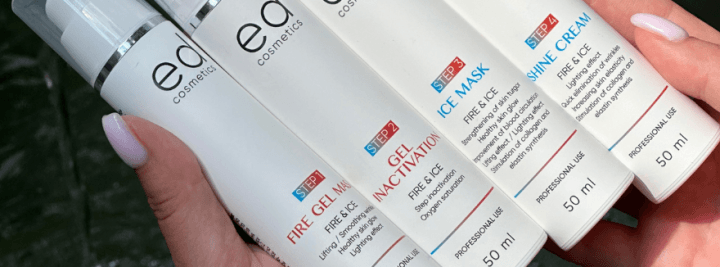Professional care for problematic skin: which approaches work best
According to dermatological studies, around 9.4% of people worldwide experience acne. Up to 85% of teenagers deal with skin inflammations. Moreover, approximately 31.9% of women and 20.5% of men aged 20–70 suffer from active acne. For teenagers, the cause is often hormonal fluctuations, while in adults the reasons may be far more complex: from stress and diet to hormonal imbalances and improper skincare. Nadija Dilay, scientist and co-founder of the Ukrainian skincare brand ED Cosmetics, shared which approaches to problematic skin care work best.
Key principles of professional work with problematic skin
The main task of a cosmetologist is not just to reduce inflammation, but to create a comprehensive, safe, and effective skincare strategy. The program is rarely universal, since it is important to take into account:
- skin type and condition (oily, combination, sensitive, with impaired barrier),
- causes of inflammation (from hormonal changes and stress to dietary triggers and improper home care),
- degree of acne activity (comedonal, papular, pustular, nodulocystic),
- seasonality and photosensitivity,
- accompanying dermatological conditions (rosacea, seborrheic dermatitis, etc.),
- psycho-emotional factors that may affect the overall state of the body, including the skin.
Still, there are several steps that are important regardless of individual skin characteristics.
1. Diagnostics, gentle yet deep cleansing
We begin with a thorough analysis of the skin’s condition, inflammation level, barrier integrity, and photosensitivity. Damage to the hydrolipid barrier directly leads to worsening inflammation. Therefore, instead of aggressive agents, it is worth choosing mild surfactants or hydrophilic oils that remove sebum and impurities while preserving balance. In treatment protocols, combining oil cleansing with enzyme powder as a second step works well.
2. Enzyme powder as a safe exfoliant
Enzyme powder is an irreplaceable tool for working with problematic skin. ED Cosmetics’ vitamin C enzyme powder activates easily with water, contains enzymes that selectively dissolve dead cells without damaging healthy tissue, and works gently yet effectively:
- minimizes the risk of injury with active breakouts,
- prevents pore clogging and comedone formation,
- increases the effectiveness of actives – serums and masks penetrate deeper after the powder.
In cosmetology clinics, enzyme powder is often used before acid peels or hardware treatments, while at home it helps maintain results between visits.
3. Sebum control and exfoliation
Enzyme powder is combined with acids: first it “loosens” the surface, then acids (salicylic, azelaic) finish the cleansing process. Low-concentration acids help regulate sebaceous gland activity and reduce hyperkeratosis.
4. Soothing and restorative therapy
The next step is to restore pH and calm the skin: pH-balanced toners and formulas with ceramides, postbiotics, oat extract, or allantoin help prevent dryness and irritation. LED light, microcurrents, and masks with niacinamide and zinc reduce inflammation and redness.
5. Regularity and maintenance
Even the best procedure loses effectiveness without proper home care. Gentle cleansing, targeted use of enzyme powder, and barrier creams at home are key to long-term remission.
Working with problematic skin is not a battle, but a collaboration with the skin, its rhythms, and its needs. It is achieved through an individual approach that considers acne causes, skin condition, and accompanying factors, as well as through the use of gentle yet effective products for cleansing, exfoliation, and restoring its protective barrier.








